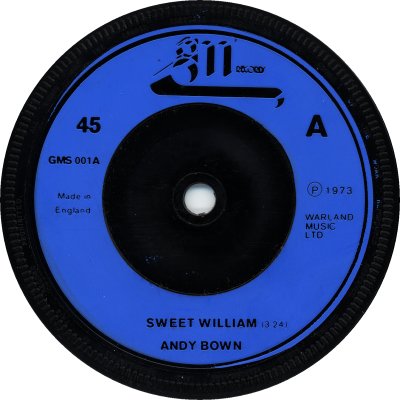
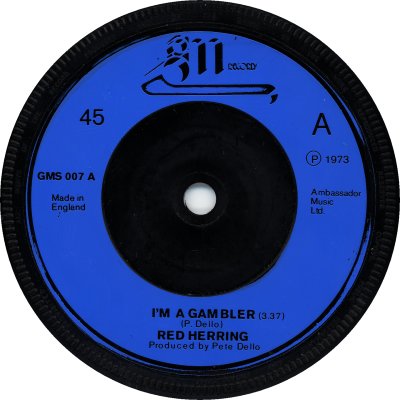
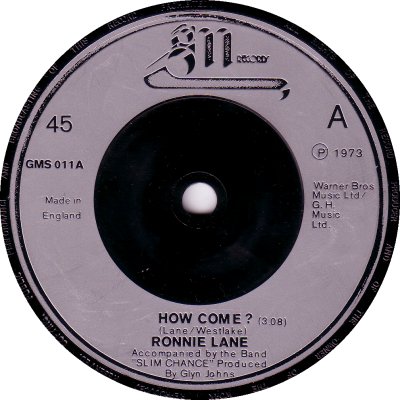
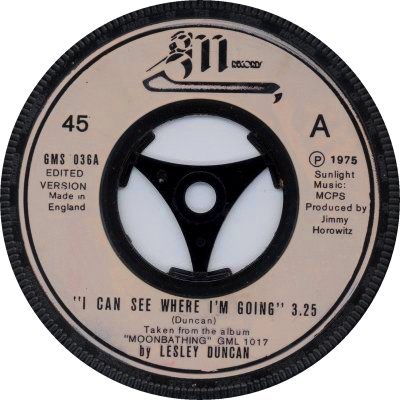
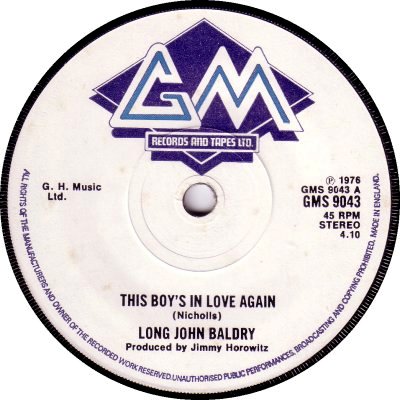
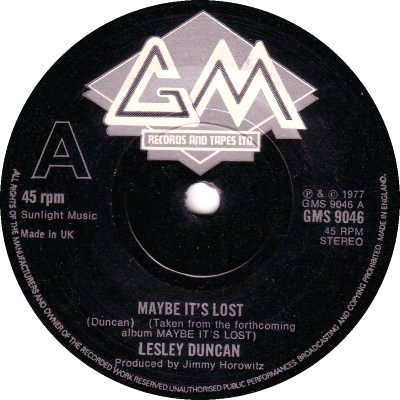
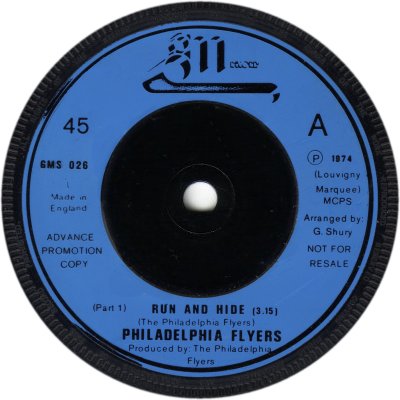
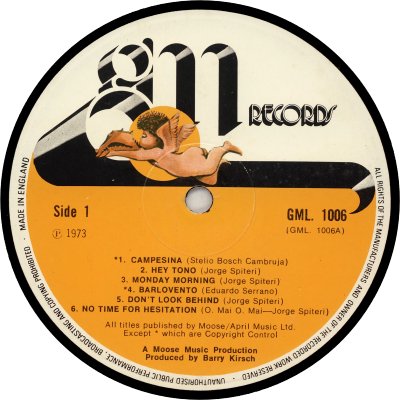
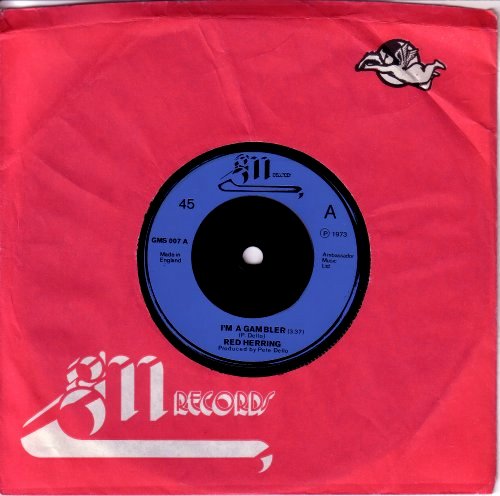
GM was one of Billy Gaff's labels, the others being Riva and Cherub (q.v. both). It had a slightly hiccupy start to its existence. Its roots lay in a management company called G.M.A. - 'Gaff Masters Associated Ltd' - which was started by Billy Gaff with Robert Masters in April 1971. Gaff was manager of Rod Stewart and The Faces, while Masters managed Atomic Rooster. Rory Gallagher, John Baldry and Lesley Duncan were also on the company's books. Gaff was to handle the American side of the business, Masters the European ('Billboard', 17th April). There was also a separate publishing company, GH Music, which was headed by Andy Heath. 'Record Retailer' of the 9th of October 1971 broke the news that GM intended to launch its own label, as yet unnamed, in the new year. Pressing and distribution were under discussion, and it was hoped that the first release would be an album by Atomic Rooster, but B&C were disputing the band's contract. The company had second thoughts, however, and 'RR' of the 19th of February reported that the plans had been abandoned. A spokesman was quoted as saying that after much consideration it had been decided not to go ahead with the label, on the grounds that record companies should sell records and management companies stick to management. He added that very few successful independent labels had been launched during the past few years, and that there were fears that GM might suffer drastically if it made the attempt to start one. A John Baldry album, 'It Ain't Easy', came out on Warner Bros (K-46088) in the second half of 1971 with credits to 'G.H. Productions' and to executive producer Jimmy Horowitz, so it may perhaps be that GM recorded the material for it and then placed it with Warner Brothers when the idea of launching a record label was abandoned - Horowitz was a director of Gaff Masters and was responsible for the company's recording commitments.
By the end of 1972 there had been a change of heart, along with changes of management and of the company's name. Robert Masters left the company in the autumn - Horovitz cited disagreements about the running and direction of Gaff Masters - and a change of name to 'Gaff Management' took place ('BB', 2nd September 1972). Then 'Music Week' of the 21st of October said that Gaff was planning a new label for the following March, and that he was having discussions with Phonogram about possible financial backing and about using Phonodisc for pressing and distribution. According to the article, Status Quo had signed with Gaff Management and were 'almost certain' to be on the new label (it never happened), while Rod Stewart would stay where he was, with Warner Bros. GM was examining an Island-like set-up, where it would have its own sales and distribution arms serving the major outlets while Phonogram served the rest. 'BB' of the 23rd of May 1973 was able to add some background to the decision to go ahead with a record label: it quoted Gaff as saying that as a number of acts represented by GM were not being handled correctly by their record companies it had been a logical step for the company to form its own. Consultations had been held with Joe Smith of Warner Bros. in the USA, and Warner now had a financial stake in GM, though control remained 'firmly' with Gaff and managing director Brian Hutch. Smith and WEA financial director Terry Stanley were on GM's board of directirs, which emphasized the link between the two concerns. 'MW' of the 27th of January 1973 was able to report that matters were progressing: the label now had a name, 'GM', and was scheduled for launch in the spring, though the manufacturing and distribution deal with Phonogram had yet to be finalized. GM was not to be solely a vehicle for Gaff Management artists, and 'outsiders' would appear on its roster.
Hopes for a spring launch proved slightly optimistic. 'MW' of the 31st of March put the date back to June, but was able to say that a three-year pressing and distribution deal had been signed with Phonogram. In the event the acquisition of some material that was too lightweight for the main GM label led to a 'Pop' label, Cherub, coming on the scene before GM did. 'MW' of the 28th of April 1973 said that Cherub was to be launched in two weeks' time, before the first scheduled release on GM, and it quoted Brian Hutch as saying that it would be essentially the company's 'Pop singles' label - GM itself was intended to to be basically a 'contemporary Rock' outlet. The first product on the actual GM label appeared in the shops on the 25th of May, and the company settled into its groove. Its arrival was marked by a long feature in 'BB' of the 23rd of May, which can be found on the Google Books site. There were teething troubles: 'MW' of the 20th of October 1973 claimed that the 'GMS' prefix of the singles' GMS-000 catalogue numbers might have to be changed because of possible confusion with those of Gemini Records (q.v.), which were the same; it was thought that some orders for Red Herring's 'I'm A Gambler ' b/w 'Working Class Man' (GMS-007; 8/73) appeared to have gone astray. Fortunately for GM, Gemini appears to have been in decline at that point, and the change never had to take place. Then 'MW' of the 1st of December broke the news that Brian Hutch had resigned; Billy Gaff was substituting for him temporarily. In addition Cherub failed to see the year out and was abandoned after a mere four releases. There were plus points, however: Ronnie Lane gave GM its first Chart success with 'How Come?' b/w 'Tell Everyone' and 'Done this Before' (GMS-011; 12/ 73), which only just missed out on the Top Ten; and the follow-up, 'The Poacher' b/w 'Bye And Bye' (GMS-024; 5/74) also scored, though it only reached the Top Forty.
In the autumn of 1975 GM left Phonogram. 'MW' of the 23rd of August announced that the company's next release would be a four-track EP from the soundtrack to the film 'Dick Deadeye'; it would feature Linda Lewis and John Baldry among others and would be numbered GMS-037. The EP seems not to have been issued, and may have fallen victim to the move. 'MW' of the 27th of September reporting on the split, said that GM was negotiating manufacture and distribution with another major; until matters were resolved Andy Bown's current single 'Supersonic' b/w 'Feeling Better' would be available through WEA. Presumably as a result of that arrangement a figure '9' was added to its catalogue number, which became GMS-9039. The arrangement with WEA must have proved satisfactory, as GM remained with that company for the rest of the decade.
The arrival on the scene of another Gaff label, 'Riva' (q.v.) in 1975 led to rumours in the industry that GM might be absorbed by the newcomer, but in 'MW' of the 9th of August the general manager of GM, Mike Gill, asserted that Riva's advent would 'In no way' affect GM. That turned out to be not entirely the case, as there was only one GM single released during the whole of 1976. The label did however get going again at the start if 1977, and 'MW' of the 22nd of January was able to say that while it had been 'dormant during the build-up of Riva', it had been 'reactivated'. Some of the impetus seems to have gone, all the same. GM released five singles in 1977, three in 1978, and just one - its final 'new release' - in the summer of 1979. Bill Barclay's 'I Ain't Gonna Drink Anymore' b/w 'Passing Show' (GMS-035) was reissued in May 1981, providing something of an afterthought, but that was the lot. Riva continued on, and it may be that artists who might have appeared on GM appeared on Riva instead. Despite the fact that the company boasted a respectable roster of artists, including some well-known names, the Ronnie Lane singles were the only ones to hit the Charts. The possibility of a Classical music label, via a link with Supraphon Records (q.v.), was mentioned in 'BB' of the 23th of May 1973 but never materialized.
During the Phonogram / Phonodisc era GM's singles had injection moulded labels and were numbered in a GMS-000 series. The planned design for the label proved unsuitable for Phonodisc's moulding process, and had to be adapted ('BB', 23rd May 1973). It may be that the 'cherub' who is present on the (paper) album label (8) added an unacceptable degree of complexity, as it is absent from the single label. Personally I would have liked to see GM singles with paper labels and the 'cherub' design instead of the injection moulded type, which are dull by comparison, but there you go. The cherub, however, did appear on the company sleeve (9). The first release had neither writer nor producer credits on its label (1), but those of subsequent ones were more informative (2). Various colours were used: blue up to and including GMS-031, and silver (3) from GMS-032 to GMS-036, were the main ones, but some records came in more than one colour, presumably because of re-pressings, and the occasional fawn one turned up (4).
When GM moved under the WEA umbrella in the second half of 1975, joining Riva there, CBS took over manufacture, while distribution was through the shared CBS / WEA facility. Paper labels were adopted and their design was fundamentally changed, including a bold new logo (5). The white labels remained until the end, except for the trio of GMS-9046 to 9048 and a reissue of 9041, which came out in the second half of 1977 and had black ones (6). As mentioned above, with the move to WEA there was also a slight change in the catalogue numbers, the singles' series gaining a '9' and becoming GMS-9000. This GMS-9000 series reached 9052. There were no company sleeves during the WEA period. WEA took over the distribution of its own and associated labels, including GM, in the middle of 1977, and took charge of their manufacture from the start of 1978. Demo copies of GM singles weren't given any special labels or markings as such, though at least two singles were made available in demo form, with different 'B' sides to the issues. The labels of those records were marked appropriately (7).
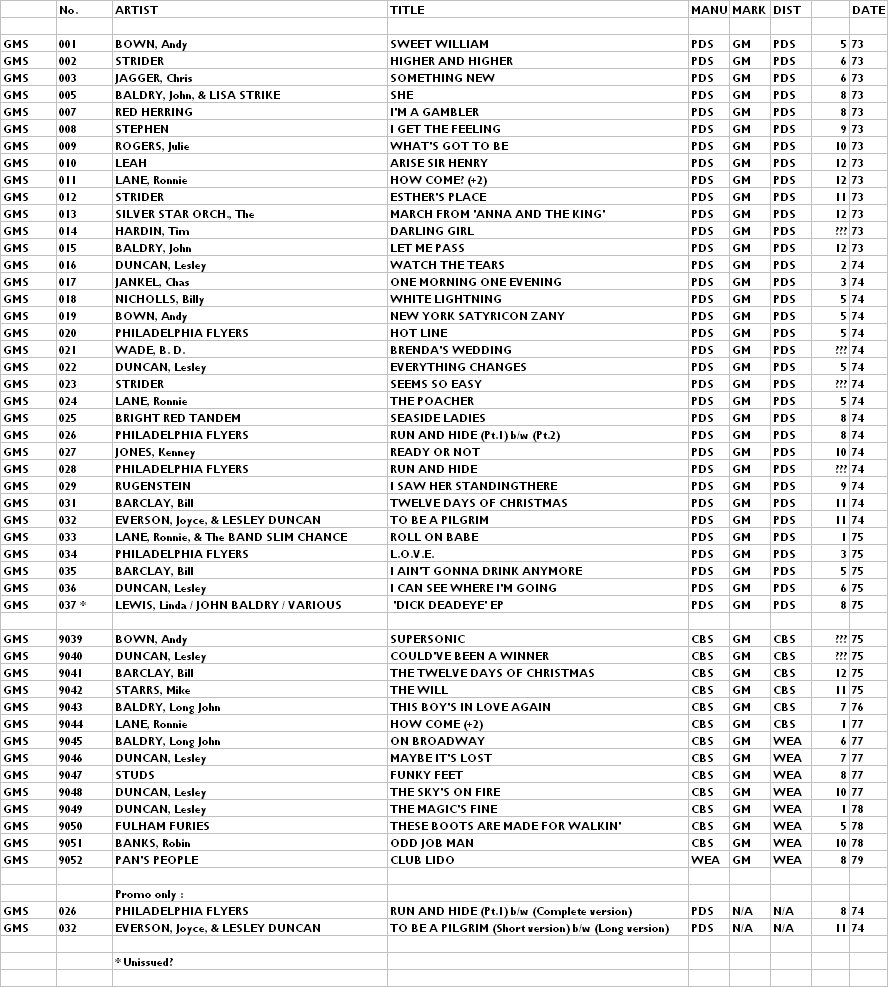


Copyright 2006 Robert Lyons.

